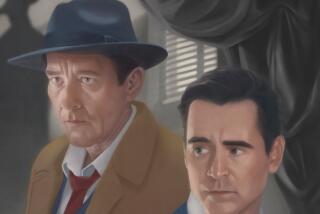MOVIE REVIEW : Belgium’s ‘Marquis’: A De Sade Bestiary
- Share via
French writer Roland Topor, a satirist and caricaturist, and Belgian director (and co-writer) Henri Xhonneux had the singularly inspired idea to dramatize the incarceration of the Marquis de Sade in the form of a bestiary, one of those medieval natural history books illustrating moral fables.
Their approach to De Sade, which requires that all the actors wear animal masks, allows for a richness of meaning in their amusing, outrageous and finally poignant allegory “Marquis” (at the NuWilshire). The film could scarcely be more timely as a call for freedom of expression and sexual liberation.
Their Marquis is a gentle, supremely intelligent spaniel imprisoned, as the French Revolution draws near, for blasphemy, his specific act bringing to mind artist-photographer Andres Serrano’s “Piss Christ,” which was one of the centerpieces of the National Endowment for the Arts controversy. De Sade spends most of his time engaged in philosophical debate--when they aren’t arguing over who controls whom--with his own penis, which is called Colin. Other key characters are the prison guard Ambert, a rat enamored of the Marquis; Justine, a heifer whose only crime is that she has become pregnant by the King; Dom Pompero, a Jesuit camel who is the prison’s totally corrupt chaplain, and Gaetan de Preaubois, a masochistic rooster who is the Bastille’s warden. (Topor and Xhonneux’s notion of what brought about the fall of the Bastille is especially hilarious.)
Although “Marquis” presents a De Sade who’s far more intellectual than sexual, this Belgian film is not exactly a Muppet movie, to be sure. (Juliet, however, is as much a charmer as Miss Piggy.) Topor’s art direction gives the film the quaintly ribald look of Hogarth’s “The Rake’s Progress.” The use of masks and the stylized look of the entire production distance the outright cruelty and raunchiness of much of what occurs; “Marquis” is a far, far easier film to watch than Pasolini’s hideously graphic “Salo.”
On the most obvious level, the masks suggest quite literally that men are beasts and behave accordingly. That’s not really “Marquis’ ” key point, which is to insist on acknowledging the full panorama of human nature and behavior and then to suggest that mind and the spirit are locked in an incessant struggle for supremacy with lust. Evil is seen not as a matter of sex but of stupidity, greed and the drive to have absolute power over others. A comprehensive knowledge of French history and culture is essential to appreciating all the film’s many references and allusions, yet “Marquis” (Times-rated Mature for sex, violence and language, and for adult themes) is clearly a movie for all seasons.
‘Marquis’
Francois Marthouret: Marquis
Valerie Kling: Colin
Michel Robin: Ambert
Isabelle Canet-Wolfe: Justine
A First Run Features release of a Y.C Alligator Film/Constellation/Tchin Tchin production. Director Henri Xhonneux. Conceived and written (with Xhonneux), with design of the original creatures and artistic direction, by Roland Topor. Executive producer Eric Van Beuren. Cinematographer Etienne Fauduet. Editor Chantal Hymans. Costumes Maryvonne Herzog. Music Reinhardt Wagner. Art director Pierre-Francois Limbosch. Sound Joel Rangon, Dominique Hennequin. In French, with English subtitles. Running time: 1 hour, 23 minutes.
Times-rated Mature (for sex, violence, language and for adult themes).
More to Read
Only good movies
Get the Indie Focus newsletter, Mark Olsen's weekly guide to the world of cinema.
You may occasionally receive promotional content from the Los Angeles Times.










